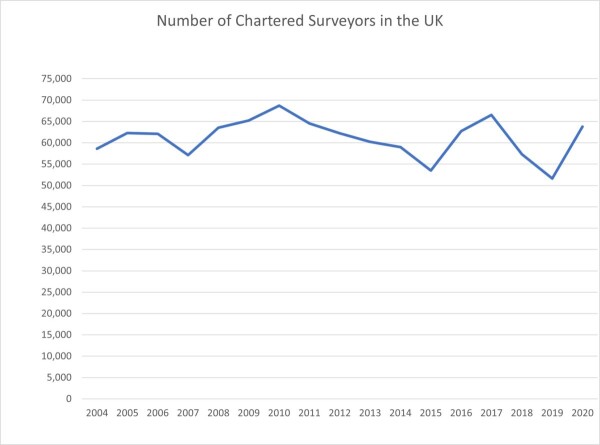Surveyors play a key role in shaping the world. From helping to develop sustainable cities, to solving global issues like urbanisation, migration, and resource scarcity. Surveyors are involved throughout the lifecycle of buildings, from buying the land to managing the finished building. They’re even involved in a building’s final demolition decades later.
But why is there such a shortage?
The Recession
There are several reasons why there is a shortage of surveyors.


Due to the recession, 2007 saw a sharp decline of surveyors. Companies made redundancies, with surveyors suffering the most due to an over-supply of qualified staff. This meant that candidates had to find alternative roles due to job loss. This also hugely affected graduates who were ‘promised’ roles when they finished their degrees. Many students were then discouraged from studying which could explain the decline over the next few years.
The number of surveyors peaked in 2010, many students would now have graduated and achieved their RICS status. However, the number of surveyors within the UK continued to decline even though the property industry began to improve. Students no longer wanted to pursue a career in surveying.
Education and Experience
Becoming a chartered surveyor takes a long time. However, RICS are keen to not create barriers to entry due to the demand. There are four different routes that individuals can take, with the shortest being a minimum of five years!
Route 1: A RICS accredited degree followed by the APC (The Assessment of Professional Competence). The APC is a structured training work placement over a minimum of 24 months to ensure Chartered Surveyors are competent to practice (5 Years).
Route 2: Candidates graduating in a non-RICS accredited degree and then undertake a post-graduate RICS accredited degree for one year before embarking on their APC (6 Years).
Route 3: Professionals with a degree with at least five years post-degree experience can achieve membership in 12 months through a fast-tracked version of the APC (9 Years).
Route 4: RICS are keen not to create barriers to entry. They recognise that obtaining a degree can be expensive and not for everyone. Therefore, young school leavers can sign up for the Chartered Surveyors Training Trust. This is an organisation that helps young people to become surveyors by offering apprenticeship schemes that count towards associate membership (AssocRICS) (6 Years).
Brexit
Another reason why is due to the UK’s decision to exit the EU. Being a member of the EU allows EU Nationals the option to work and live in the UK. However, Brexit has made it very difficult and impossible for these people to move to the UK, which is likely to be a reason behind the shortages in the UK from 2019 onwards.
MRICS Surveyors are in demand all over the world
Although RICS originated in the UK, the chartered status is recognised globally. This means career opportunities as an RICS registered surveyor are endless. RICS has members in over 120 countries, including North America, South East Asia, the Middle East, South Africa and Europe. The opportunity to move abroad is a big benefit compared to working in the UK.
Surveyors are too comfortable
Salaries across the UK are starting to rise because of the shortages and candidates are becoming aware of their market worth. Those with an accredited status and a wealth of experience have the best pick wanting a competitive salary and flexible benefits with clear career development.
If you want to get ahead of the market, check out our other blogpost! Surveyors have been working in a candidate led market for a while now and you should be taking advantage!
